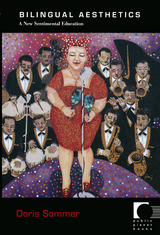
Sommer encourages readers to entertain the creative possibilities inherent in multilingualism. With her characteristic wit and love of language, she focuses on humor—particularly bilingual jokes—as the place where tensions between and within cultures are played out. She draws on thinking about humor and language by a range of philosophers and others, including Sigmund Freud, Immanuel Kant, Ludwig Wittgenstein, Hannah Arendt, and Mikhail Bakhtin. In declaring the merits of allowing for crossed signals, Sommer sends a clear message: Making room for more than one language is about value added, not about remediation. It is an expression of love for a contingent and changing world.
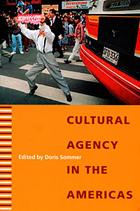
Based in North and South America, scholars from fields including anthropology, performance studies, history, literature, and communications studies explore specific variations of cultural agency across Latin America. Contributors reflect, for example, on the paradoxical programming and reception of a state-controlled Cuban radio station that connects listeners at home and abroad; on the intricacies of indigenous protests in Brazil; and the formulation of cultural policies in cosmopolitan Mexico City. One contributor notes that trauma theory targets individual victims when it should address collective memory as it is worked through in performance and ritual; another examines how Mapuche leaders in Argentina perceived the pitfalls of ethnic essentialism and developed new ways to intervene in local government. Whether suggesting modes of cultural agency, tracking exemplary instances of it, or cautioning against potential missteps, the essays in this book encourage attentiveness to, and the multiplication of, the many extraordinary instantiations of cultural resourcefulness and creativity throughout Latin America and beyond.
Contributors. Arturo Arias, Claudia Briones, Néstor García Canclini, Denise Corte, Juan Carlos Godenzzi, Charles R. Hale, Ariana Hernández-Reguant, Claudio Lomnitz, Jesús Martín Barbero, J. Lorand Matory, Rosamel Millamán, Diane M. Nelson, Mary Louise Pratt, Alcida Rita Ramos, Doris Sommer, Diana Taylor, Santiago Villaveces

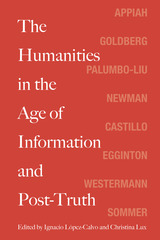
While the reader may suspect that these types of lucubration are a desperate reaction to decreased public funding for the humanities worldwide, a decreased enrollment of students, or anxiety over the future of our profession, there is in this volume a coherent argument for the continued need, perhaps more now than ever, to invest in humanities education if we are to have informed and socially conscious citizens rather than just willing consumers and obedient workers. Furthermore, the essays prove that the humanities and the arts are, after all, not a luxury but an integral part of a complete scholarly education.
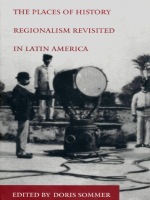
Representing a broad range of contemporary criticism, this volume features many short essays by the most well-known and respected Latin Americanists, each devoting attention to specific matters of history. The topics range from Incan architecture to Chicano and Nuyorican habitats; from turn of the century Argentine criminology to Caribbean homophobia; from the rhetorics of independence and dictatorship to Mexican ambivalence about opera and Brazil’s move beyond monarchy; and from the precarious survival of Spanish language in Latin America to its paradoxical legacy of enlightenment in the Philippines. Originally published as a special issue of Modern Language Quarterly (June 1996), this expanded edition includes a new introduction by Doris Sommer and a new essay by Vincente Rafael. Viewed together, these essays reveal a cultural richness that is sure to interest literary scholars and Latin Americanists alike.
Contributors. Carlos J. Alonso, Antonio Benítez-Rojo, John Beverley, Debra A. Castillo, Arcadio Diaz-Quiñones, Juan Flores, Mary M. Gaylord, José Limón, Josefina Ludmer, Francine Masiello, Antonio Mazzotti, Walter D. Mignolo, Sylvia Molloy, Mary Louise Pratt, Vincente Rafael, Julio Ramos, Susana Rotker, Roberto Schwarz, Diana Taylor, Nancy Vogeley


Let the reader beware. Educated readers naturally feel entitled to know what they're reading--often, if they try hard enough, to know it with the conspiratorial intimacy of a potential partner. This book reminds us that cultural differences may in fact make us targets of a text, not its co-conspirators. Some literature, especially culturally particular or "minority" literature, actually uses its differences and distances to redirect our desire for intimacy toward more cautious, respectful engagements. To name these figures of cultural discontinuity--to describe a rhetoric of particularism in the Americas--is the purpose of Proceed with Caution.
In a series of daring forays, from seventeenth-century Inca Garcilaso de la Vega to Julio Cortázar and Mario Vargas Llosa, Doris Sommer shows how ethnically marked texts use enticing and frustrating language games to keep readers engaged with difference: Gloria Estefan's syncopated appeal to solidarity plays on Whitman's undifferentiated ideal; unrequitable seductions echo through Rigoberta Menchú's protestations of secrecy, Toni Morrison's interrupted confession, the rebuffs in a Mexican testimonial novel. In these and other examples, Sommer trains us to notice the signs that affirm a respectful distance as a condition of political fairness and aesthetic effect--warnings that will be audible (and engaging for readings that tolerate difference) once we listen for a rhetoric of particularism.

Winner of the John Collier Jr. Award for Still Photography
As a young Fulbright scholar in Bogotá determined to democratize the photographic gaze and bring new visions and voices to public debate about Colombia’s armed conflict, Alexander L. Fattal founded Disparando Cámaras para la Paz (Shooting Cameras for Peace). The project taught photography to young people in El Progreso, a neighborhood on the city’s outskirts that was home to families displaced by violence in the countryside. Cameras in hand, the youth had a chance to record and reimagine their daily existence.
Shooting Cameras for Peace / Disparando Cámaras para la Paz is a penetrating look at one of Latin America’s most dynamic participatory media projects. The haunting and exuberant photographs made under its auspices testify to young people’s will to play, to dream, and to survive. The images bear witness to the resilience and creativity of lives marked by a war that refuses to die.
With text in English and Spanish, Shooting Cameras for Peace / Disparando Cámaras para la Paz makes vital contributions to studies of collaborative media, photographic activism, and peace and conflict in Colombia. Fattal’s insightful text offers critical reflection on the genre of participatory photography and the structural challenges faced by similar media projects.
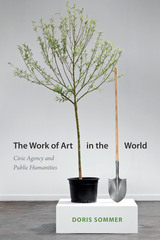
READERS
Browse our collection.
PUBLISHERS
See BiblioVault's publisher services.
STUDENT SERVICES
Files for college accessibility offices.
UChicago Accessibility Resources
home | accessibility | search | about | contact us
BiblioVault ® 2001 - 2024
The University of Chicago Press









